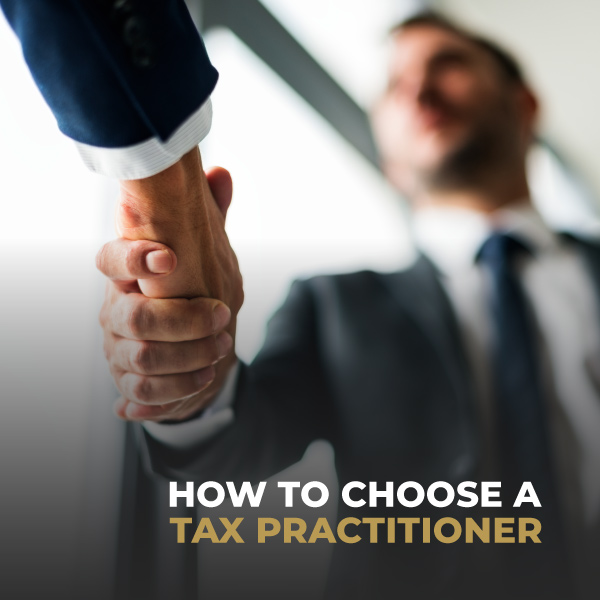HOW TO CHOOSE A TAX PRACTITIONER: ASK THESE QUESTIONS
Your friends and family may have advised you to hire a tax practitioner to make sure you remain tax compliant. But how do you choose the right one for you? Vetting a tax practitioner requires asking the right questions and being aware of the kind of service you ought to expect. We asked some tax experts to give us some guidelines.
What are the advantages of tax practitioners?
According to Taritha Oosthuizen, tax consultant at Tax Consulting South Africa, tax professionals are equipped to analyse your tax matters in a way that optimises your tax planning options, and provide advice that is tailored to suit your personal situation.
“They are best equipped to lodge disputes against the South African Revenue Service (SARS), where a taxpayer disagrees with an additional assessment raised, or where an unfair liability exists on their account,” says Oosthuizen.
She adds that in some cases, practitioners can develop good working relationships with SARS officials, and this can benefit the taxpayer when resolving complex matters.
The field of tax is diverse, Oosthuizen explains, and to ensure that you receive the correct advice and guidance it is important to engage a tax practitioner that is an expert in the field of tax that applies to your situation.
“It is common sense that you will not request your mechanic to determine whether you have the flu or not, the same applies for your tax affairs,” says Oosthuizen.
In her experience, taxpayers are not aware of the status of their tax affairs and what is required to regularise their tax position.
“It will become clear to you whether your prospective tax advisor has the necessary competence to approach your tax affairs when requesting them to explain the process and methodology they would use to regularise your affairs,” says Oosthuizen.
Quiz your tax practitioner before hiring them
According to Barbara Mundell, certified financial planner and director of Financial Essence, it’s important to note that not everyone needs to file a tax return.
“A person who earns less than R500,000 annually, has only been employed with one employer, has no other allowable deductions, and has not received any other income, does not need to submit an income tax return,” says Mundell.
However, she explains that where other income has been received, or where the person runs a business, it’s recommended that they consult a professional to assist them to ensure that their return is completed accurately.
This being said, she recommends asking the following questions before settling on a tax practitioner:
- With which recognised professional body are you registered?
- How much do you charge and what does your fee entail? It is unlawful to charge a contingency fee (percentage of the refund), and practitioners engaging in such conduct should be reported.
- Are you able to assist with further objections and appeals if I disagree with the outcome of the SARS assessment? If so, how much do you charge? In some instances, the fees that practitioners charge is simply not affordable for the clients and this leaves them at the mercy of SARS. Knowing what these fees are upfront can help manage your expectations.
- Do you allow clients shared access to their efiling profiles? SARS allows this facility to assist clients to remain in control of their taxes. This allows clients to receive communication from SARS and allows clients to hold their tax practitioners accountable.
According to Nicci Courtney-Clarke, head of tax at TaxTim, you should find out whether a tax practitioner is correctly registered.
“This means they should be registered with a regulatory body, such as SAICA, as well as SARS, and therefore, would have to carry out continuous professional development in the form of training courses and webinars to keep up with technical updates affecting the tax industry,” says Courtney-Clarke.
She explains that they should have a tax practitioner reference number, which you should ask for, and verify on the SARS website.
What’s the downside of a tax practitioner?
According to Sheldon Friedericksen, CFO at Fedgroup, as your tax affairs become more complicated than you feel comfortable managing, you may require a tax practitioner to assist you.
However, there are downsides to tax practitioners. He points out two of these:
- Some tax-related affairs for individuals are simple, and with the introduction of an auto assessment from SARS a tax practitioner would not be required. A tax practitioner may oversell your need for them if your tax affairs are simple.
- The tax practitioner acts as your representative and assumes responsibility for completing and managing your tax affairs. However, this does not absolve you from your responsibility as a taxpayer. You remain responsible in the eyes of SARS and the law. As such it is important that you remain involved in the process, aware of the requirements, and any items that the tax practitioner is applying their judgment on.
![2025-logo-[Recovered] Tax Consulting South Africa](https://www.taxconsulting.co.za/wp-content/uploads/2025/01/2025-logo-Recovered.png)



